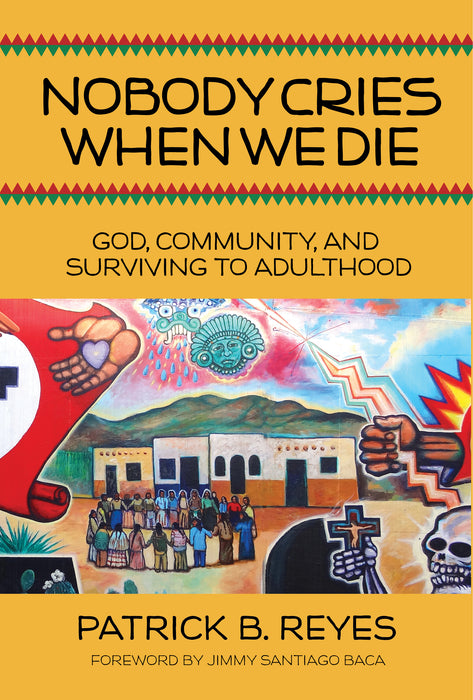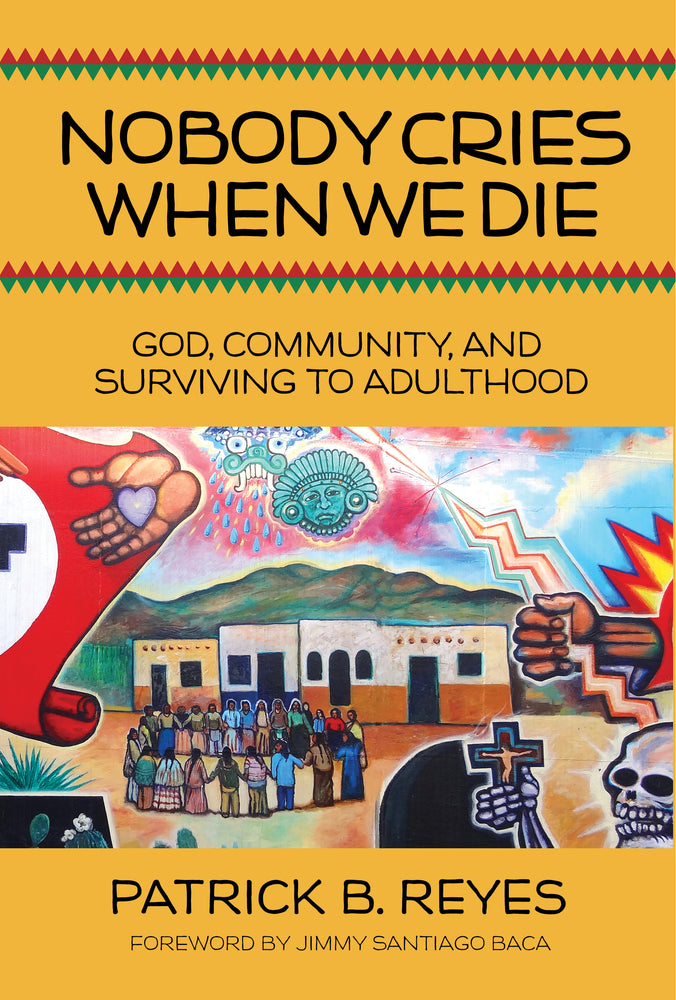Nobody Cries When We Die: God, Community, and Surviving to Adulthood
by Patrick B. Reyes
Foreword by Jimmy Santiago Baca
When the screams of innocents dying engulf you, how do you hear God’s voice? Will God and God’s people call you to life when your breath is strangled out of you?
For people of color living each day surrounded by violence, for whom survival is not a given, vocational discernment is more than “finding your purpose”—it’s a matter of life and death. Patrick Reyes shares his story of how his community saved him from gang life, abuse, and the economic and racial oppression that threatened to kill him before he ever reached adulthood.
A story balancing the tension between pain and healing, Nobody Cries When We Die takes you to the places that make American society flinch, redefines what you are called to do with your life, and gives you strength to save lives and lead in your own community.
Hispanic Theological Initiative Book of the Year
Part of the FTE (Forum for Theological Exploration) Series
Endorsements
“At times both poetic and prophetic, Nobody Cries When We Die is a passionate hybrid of autobiography and theological reflection. To read this book is to enter into the world and experience it through the lens of a faithful Christian who sees struggle and injustice all around him, and there, in the midst of it all, finds God calling out for mercy and change. It belongs on every shelf that holds Willie Jennings’s The Christian Imagination and Ta-Nehisi Coates’s Between the World and Me.” —Callid Keefe-Perry, author of Way to Water, cohost of Homebrewed Christianity, cofounder of Theopoetics
“Reyes’s collection of stories offers an eye-opening window to Latinx life in the US. Written in a beautiful prose, the author recounts his experiences in a community forced into violence and finds a common thread in the permanent struggle for justice and healing. This is a must read for anyone who trusts we can build a better world.”― Santiago Slabodsky, Florence and Robert Kaufman Endowed Chair in Jewish Studies, Hofstra University
“Reyes does not pull any punches as he takes his reader on a journey that can be a both heartbreaking and profoundly affirming story. Through a powerful retelling of his own spiritual autobiography, Dr. Reyes demonstrates how through God's redemptive power, his sense of calling and vocation have emerged, even in the midst of trauma, pain, loss and oppression. The text challenges the reader to consider how one’s own vocation can be heard and expressed in the messiness of everyday life.”― Dr. Michael W. DeLashmutt, Vice President and Dean for Academic Affairs, The General Theological Seminary of the Episcopal Church
“In Nobody Cries When We Die, Patrick Reyes vibrantly presents our common yearning to embrace a vocation to life. What God wants for us is life in abundance, to walk the life of justice and compassion with joy. Reyes anchors his narrative at the margins and in this, we all find the ‘good soil’ and invitation to live fully." —Gregory Boyle, Founder/Executive Director of Homeboy Industries and author of Tattoos On The Heart
“Patrick Reyes offers a brilliant mix of theological reflection and biographical snippets to demonstrate how ‘narrative can be used to discern vocation.’ Reyes grounds us in his firsthand accounts of ministry of la lucha, among la comunidad in a way that is not gratuitous but instead ensures the reader gets a sense of both the struggles and the ingenuity of oppressed people.” ―Pamela R. Lightsey, Boston University School of Theology, author of Our Lives Matter: A Womanist Queer Theology
“Patrick Reyes provides us with a way through some of the most difficult questions of our time as a theologian, a scholar, and a community-accountable activist. His book will be a classic text in the canon of literature produced by liberation theologians and speak to students who often are invisible in the seminary classroom. Teach it, read it, and maybe most important of all, live it!.” —Najeeba Syeed, Founder and Director of Center for Global Peacebuilding, Claremont School of Theology
“With a riveting writing style, Reyes’s memoir invites readers to explore their own inner labyrinth of Christian vocational discernment. His approach to examining the depths of wisdom in the lived experience of ordinary, often overlooked, people is a breath of fresh air for theological writing and a gateway for readers to encounter the Divine in the seemingly mundane.”―Gregory C. Ellison II, Ph.D., Associate Professor of Pastoral Care and Counseling, Emory University, Candler, School of Theology and Founder of Fearless Dialogues
"Patrick Reyes has given us a beautiful witness to the power, creativity, and resilience at the heart of Christian community. This is a book that every young person needs to read to be encouraged and enlivened in their call, and every leader in churches, theological education, and non-profits must listen to if they are going to adequately create space for the future generation of leaders." ―Dr. Brian Bantum, Seattle Pacific University, author of The Death of Race: Building a New Christianity in a Racial World
"Among its many contributions, the book powerfully demonstrates how story, land, and the realities of marginalized communities reconfigure our understanding of vocation.”―Jorge Juan Rodríguez V, Perspectivas: The Journal of the Hispanic Theological Initiative ( read the full review )
“Nobody Cries When We Die lifts up the voices and stories of people who often suffer in silence but whose voices deserve to be heard.”―Romal Tune, author of God’s Graffiti: Inspiring Stories for Teens
“Patrick B. Reyes offers one of the most arresting insights I’ve ever read regarding how institutions of theological education interpret experiences that fall outside the white, middle-class norm."―The Christian Century (read the full review here)


